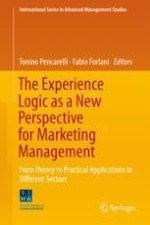2018 | OriginalPaper | Buchkapitel
The Tourist Offer of the Destination in an Experience Logic Perspective
verfasst von : Fabio Forlani, Tonino Pencarelli
Erschienen in: The Experience Logic as a New Perspective for Marketing Management
Aktivieren Sie unsere intelligente Suche, um passende Fachinhalte oder Patente zu finden.
Wählen Sie Textabschnitte aus um mit Künstlicher Intelligenz passenden Patente zu finden. powered by
Markieren Sie Textabschnitte, um KI-gestützt weitere passende Inhalte zu finden. powered by
